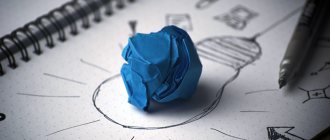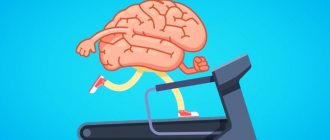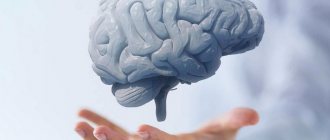Hello dear readers! Lyudmila Redkina is in touch. We continue to explore the depths of human psychology. And on our agenda we have a super topic that is useful for all people! Do you know anyone with a phenomenal memory? I remember there was a man named Cicero. Many people remember him, right? So tell me, why was he so special? This young (I hope, at that time) man, absolutely without any hints, sketches or cheat sheets, could proclaim huge texts, aphorisms, quotes - and all this IN MEMORY! In this article we will figure out how to remember large amounts of information, what secrets and techniques there are.
How our brain remembers information
We receive information through the sensory senses - hearing, vision, taste, smell and touch. They help collect data, that is, perceive it. Immediately after we perceive information, we begin to remember it. This happens in 2 stages:
- Data enters short-term memory, where it is stored for several seconds.
- The entry of data into long-term memory, where it can be stored from several minutes to many years.
In the process of transferring information from perception to short-term memory, attention plays an important role - the amount of data that we can remember depends on it.
Information moves from short-term memory to long-term memory through repetition or association. The latter are of particular importance, since we connect all the concepts in memory with each other until they form a certain scheme.
The most effective method of memorization is association. If we have nothing to associate information with, then we must repeat it until it is memorized. What is the probability that we will remember the learned data? This depends on the proximity of the existing associations, the freshness of the information received and the frequency of its recall.
Stimuli that evoke certain memories in our brain are also important - these are visual images, sounds, smells, tactile sensations and the like.
What you need to know about the memory device
Memory is a complex mental function with the help of which we acquire new knowledge and gain practical experience. Our world would never have become the way we see it without the incredible capabilities of our memory.
Scientists have calculated that the volume of human memory is about a thousand terabytes. At the same time, the brain requires only 20 watts of energy to process all information. This makes it the most energy efficient place to store information.
Memory includes several interrelated processes in which different areas of the brain are involved:
- Memorizing new information and integrating it into the general system of associative connections.
- Storage in long-term memory.
- Reproduction of material in unchanged form as needed.
- Forgetting information that is unnecessary and irrelevant, according to the brain.
We will consider all these processes in detail in the article “How to develop memory,” but now we will focus on memorization.
Memorization is the first link in this long chain. Any errors and interference at this stage nullify all subsequent brain work. What does this process look like from the inside?
Any information perceived by the brain causes a response in the nervous system. Neurons (specific brain cells) become excited and begin to exchange electronic impulses. Passing along nerve fibers, these impulses leave traces and form neural pathways. Most of them are subsequently destroyed, leaving only those that managed to gain a foothold.
Consolidation occurs in two cases: if the stimulus was very strong and if the signals passed along this path many times in a row. In the first case, so-called stress memorization is activated, and in the second, memorization through repeated repetitions.
Our task is to ensure that neural pathways are strengthened as quickly as possible and with the least energy consumption. To do this, you need to know some of the features of memory and use them to your advantage.
TOP 15 tips for memorizing large amounts of information
How to remember large amounts of information?
Our intellect needs constant training to stay in shape! Vikium, a platform for training memory, attention and thinking, will help keep your brain in good shape. What attracts me here is the game form of training. There are quite a lot of online trainers, and new ones are often added.
There is also the opportunity to compete with other participants in who thinks, remembers and reacts faster . Training statistics are available, which can be compared with the achievements of other users.
Try it yourself - free registration!
We have collected 15 of the most effective tips that will help you learn to remember information, structure it and repeat data correctly. They were prepared by psychologists, neurologists, coaches and people with phenomenal memory who have used various methods to improve it. These tips will help you understand how to remember a large amount of information easily and how not to lose the information you have memorized.
Move from the general to the specific
Our brain perceives the whole picture better than its component parts. Therefore, when studying the course of a battle, you must first read its full description and only then move on to the details - dates, events, personalities and assessments.
Use rotation tactics
If you need to remember a huge amount of scattered information, try to alternate it. Are you preparing for exams in several subjects at once? It is best to divide the preparation into blocks, for example 30 minutes each, and alternate material on psychology with tests, say, in physics.
Engage your visual memory
It is a scientifically proven fact: our brain better assimilates information received through vision. Therefore, it is in your best interest to visualize the data. If you need to study a phenomenon, draw a diagram, learn words in a foreign language, make sketches of them.
Use mnemonic techniques
Associations are a more effective way of memorizing than repeated repetition. Therefore, it is worth using mnemonics techniques, rhyming, drawing parallels and associating memorized data with already known information. For example, you need to remember the number 1879. You break it down into two parts and make associations: 18 - I am 18 years old, 79 - my grandmother is 79 years old.
Approach learning from a mentor's perspective
The process of memorization is more effective if you explain the information received to someone, perhaps even to yourself. Therefore, approach your study from the position of a mentor and an expert.
Use the yellow marker method
Write notes or highlight the most important information in notebooks, printouts, books and manuals. The “yellow marker” method is based on the fact that we are much better at remembering data that stands out from the rest. It is often used in the press and is ideal for structuring and then memorizing large amounts of information.
Ensure dosed intake
Don’t try to grasp the immensity—memorizing the contents of three textbooks in a day is beyond the capabilities of even world memory champions. Break the information into blocks and ensure its dosed intake - organize a step-by-step study, which you will alternate with rest.
Increase your concentration
The effectiveness of the memorization process directly depends on concentration. If you are constantly distracted and unable to concentrate, then make it a rule to do several attention-enhancing exercises every day.
Don't miss: How to train memory and attention: TOP 10 ways
Focus on association
The process of memorizing a large amount of information should be based on associations. The brighter they are, the better. Draw parallels, use mnemonic techniques, try to see in the material as many similarities as possible with what you already know.
Repeat the material 3 times
The material studied should be repeated three times: the first - a few minutes after studying, the second - after 3-4 hours and the third - the next morning. Repetition three times with normal memory can provide almost guaranteed memorization.
Retell what you've learned
After studying a block of information, retell it. It’s better for real people, but you can do it for yourself. Try to speak as loudly as possible, with feeling and intonation. This will help connect emotional perception and remember the material faster.
Add your impressions
This advice follows from the previous one: the more emotions this or that information evokes in you, the faster it becomes etched in your memory. That's why it's worth trying to remember large amounts of data in unusual ways and in unusual places.
Increase your motivation
Motivation can affect concentration and internal discipline. You need to think and clearly understand all the benefits of memorizing the material. It is best to write them down in a column on a piece of paper.
Alternate study and physical activity
Cramming within four walls never brings the desired result. You need to alternate memorizing the material with physical activity - do no more than 2-3 hours in a row, after which take a walk, do exercises or do housework.
Avoid overload
Don’t overload yourself - this way you won’t remember even the amount of information that could remain in your head. If you need to prepare for an exam in 24 hours, focus on the most important points and save time on details. It is simply impossible to learn in 24 hours what you had to study for an entire semester.
Training is the best way to develop memory in a short time
You already know that successful memorization requires constant practice. I understand your situation, I know that you want to achieve everything in a short time. And since you are reading this article, I have an effective solution for you.
Now you can develop your memory not alone, but with a support group! For this purpose, experts on the Vikium website have prepared a course “100 names in 30 minutes.” This is a new program that consists of 9 lessons. After completing them, you will notice that you easily remember the names of new acquaintances, recognize long-forgotten comrades, and immediately remember a large number of names of a new group of people.
Vikium offers a 7-day money back guarantee!
This investment in yourself will pay off very quickly, and you will become much more productive.
In any case, friends, you have several options on which way to go: you can improve yourself or buy the “100 names in 30 minutes” course for little money and achieve results as quickly as possible.
You can also find other training options on the Vikium website. Try it, it's free. In any case, there is a guarantee that you will improve yourself and begin to remember much better. There is a review article on our blog, read:
- Brain simulators and courses Vikium - the most detailed and honest review of the online learning platform + reviews
Well, are we studying?
How to help your brain work more productively
You can do everything right but not remember anything. Information will simply evaporate, the data you have just memorized will begin to get confused in your head, intertwined and replaced. The reason for this is that your brain is tired and unprepared. How to remember a large amount of information before an exam for which you are completely unprepared? Memorize short theses in notes, but under no circumstances sit through the night over a mountain of textbooks.
How to help your brain work more productively:
- get enough sleep - normal, healthy sleep of sufficient duration has a beneficial effect on the processes of memorizing information;
- do not study the material at night - a “working” night before an exam has always been the main mistake of students, because without rest the brain simply cannot remember anything;
- eat right - add carbohydrate fruits (for example, bananas), nuts and other foods that increase brain activity to your diet;
- add oxygen - it is vital for proper brain function, so ventilate the room as often as possible;
- Don’t forget about physical activity - scientists have repeatedly confirmed that people who alternate the process of studying with physical activity better remember and assimilate the material.
If you want to force your brain to work to its fullest and think that one night of textbooks will do nothing for it, then you are mistaken. Our physiology is this: without rest, productivity, and therefore brain activity, decreases. Therefore, after a night of studying notes, you may not only not remember the information you just memorized, but also forget the information that you knew perfectly well before the “night marathon.”
Useful literature
Of course, we have not considered all the methods and secrets of quickly and effectively memorizing information. Even if I wanted to, I couldn’t fit them into one article. So if you still have questions, look for answers to them in books:
- “How to Read, Remember and Never Forget” by Mark Tigelaar
- “How to Remember (Almost) Everything, Always” by Rob Eastaway
- “Where is memory? The art of remembering" Alan Lieri
- “Train your memory” Ryuta Kawashima
- “100% memory. 25 useful memorization methods in 10 workouts” Ekaterina Dodonova
- “Matters of Memory” by Michel Pont
For a complete and detailed list of references, see our article “Books on improving memory.”
Divide and rule
Few people manage to quickly absorb a large amount of information. It is appropriate to break the subject being studied into several parts. After studying several chapters or sections, it is advisable to take short breaks. This way the brain will better and faster absorb a large amount of information received.
Ways to memorize material are cramming and logical comprehension. Memorizing a section or chapter does not mean understanding its meaning. Almost always, after reading new material, questions and incomprehensible moments remain. What to do in such a situation? It is enough to try to explain the material you read to a friend, dog or toy. When speaking to an outside participant, a person usually tries to select the optimal wording based on his own experience. At the same time, the brain begins to assimilate the material read. Complex things will gradually become clearer.
Connecting auditory and auditory memory
According to physiologists, the auditory type of memory is a powerful memorization tool. Psychologists believe that auditory memory develops more easily than visual and motor memory. Using this tool increases your memorization capabilities. To use auditory memory, it is recommended not only to write, but also to read the same cheat sheets. Repeating information out loud before the exam increases the chances of a favorable outcome.
The main method of using auditory memory is recording information on a voice recorder and listening to it. For example, you can record lectures given by a teacher, or read the material yourself using a voice recorder. Regular listening to information ensures lasting retention. At one time there was a theory that if you listen to information in your sleep, it will be remembered well, but scientists have questioned the use of this method.
Visual memory techniques
Visual memory accounts for most of the information we perceive. In educational institutions, the main emphasis when presenting educational material is on visual perception, so most of the data is located on the blackboard. To increase the capabilities of this type of memory, several visual memorization techniques are used:
- Visual material. When studying a theoretical issue, the material is supported by vivid illustrations.
- Reading. This type of activity also connects the visual analyzer to the memorization process, which allows you to imprint the necessary information in the brain.
- Note-taking. Material intended for memorization is noted using multi-colored pencils or felt-tip pens.
- Schulte tables. This “simulator” is used to train speed reading skills. During training, peripheral vision is activated, which ensures the memorization of more information.
Mnemonics
This method is a set of techniques and methods that simplify the memorization of various information. It usually requires more effort to use effectively, but is better used in situations where you need to remember things like lists or structures. For example, if you need to remember a list of medications of a certain type, mnemonics will help you do this better than other methods.
Mnemonics is based on the formation of associative series and sequences when a person replaces abstract objects with real concepts. The main thing is to use bright, interesting associations.
In mnemonics, there are several most well-known techniques:
- Acronym: You make a combination of letters that “encrypts” the complete information for memorization.
- Acrostic: You create a poem in which the initial letters of the lines form a word.
- Keywords: You highlight key words in phrases. By remembering them, you restore the entire phrase in your memory.
- Rhyming: You make up rhymes to help you remember words or numbers.
- Image-name technique (suitable for remembering names): you come up with any clear connection between a person’s name and his physical characteristics.
- Chaining: You create a story in which the word or thought you want to remember causes a chain reaction and draws the next words with it.
Repeat correctly
Our brains can be programmed - this is a scientific fact. To achieve a goal, it is necessary to understand it and work daily in the chosen direction. Therefore, if you have firmly decided that it is extremely important for you to learn English in six months, then your brain is already tuned in to intensive memorization. But in addition to regular training, regular repetition of the material covered is also important.
Use specific time intervals for best memorization: repeat the material immediately after studying, then after 15-20 minutes, after 6-8 hours (preferably before bed) and the last time after a week.
Highlighting main ideas
When reading a book or outline, it is advisable to mark key passages with a pencil or marker. This approach contains several positive aspects - the most important elements of information remain in memory and the brain remembers the location of the selected text. Marked passages can always be re-read.
Less important information will be automatically filtered out. It will take much less time to find out more useful information.
Sleep training
At one time, there was a popular theory that information is better remembered during sleep. The training subject only had to wear headphones to bed. Later, this method was questioned by scientists.
However, it is necessary to talk about the benefits of proper rest. Students who are well-rested before an exam perform better than those who sit up all night cramming the material.











